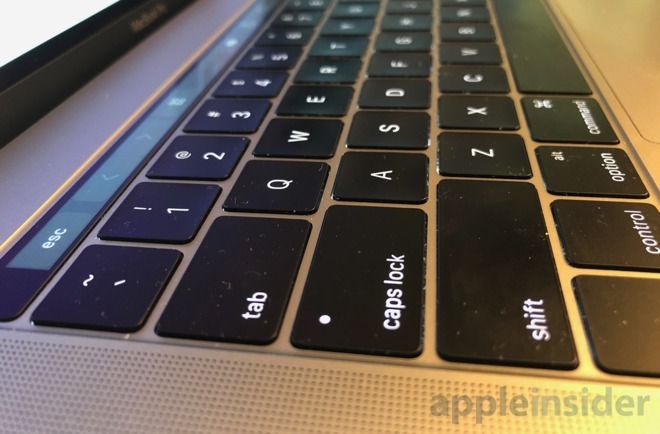Apple is extending its service program for MacBook and MacBook Pro keyboard repairs to include models released in 2018, and it making it faster for end-users as well.
Apple announced the extension on Tuesday. Originally, Apple launched its service program in 2018 for a "small percentage" of MacBook and MacBook Pro models exhibiting keyboard failures in 2018, in answer to complaints of alleged flaws in the design of the butterfly keyboard mechanism. The program enables customers who experienced repeating characters, unresponsive, or sticky keys, to bring their MacBook to Apple or an Apple Authorized Service Provider for a free service.
Initially the program covered models of the Retina 12-inch MacBook, 13-inch MacBook Pro, and 15-inch MacBook Pro released between 2015 and 2017, but did not include those released in 2018. In the extension, the program now covers servicing of the previously-excluded 2018 models.
For today's also-announced updates to the MacBook Pro, Apple has refined the design of the keyboard to try and reduce the number of unresponsive or double-typing key instances. During a call to media, Apple advised some existing owners of the 13-inch and 15-inch MacBook Pro with Touch Bar that use the third-generation keyboard may find their keyboards replaced with one of the newer variants.
Apple updated the design of the third-generation butterfly mechanism in 2018 to include a thin silicone membrane, which encased the mechanism with a film around the sides. It is thought the membrane is an attempt to make the keys quieter as well as helping to prevent debris from interfering with the mechanism, but Apple has so far only advised of its quietening nature.
Independent testing of the third-generation's membrane tested the theory that it protected the mechanism, but found that it didn't work that effectively, with fine dust pushed to the edges to keep the mechanism clear, but failing under larger quantities of debris.
Apple has so far issued an apologetic statement over more recent complaints about the 2018 mechanism, reiterating similar communications on the matter in advising issues only affected a small number of users.
AppleInsider's accumulation of repair service data from March indicated the failure rate of the 2018 model's keyboards was lower than the 2016 versions, but about the same as the 2017 models, despite the addition of the membrane.
 Malcolm Owen
Malcolm Owen







-m.jpg)






 Marko Zivkovic
Marko Zivkovic
 Wesley Hilliard
Wesley Hilliard
 Amber Neely
Amber Neely


 William Gallagher
William Gallagher

 Christine McKee
Christine McKee



-m.jpg)



12 Comments
Time to just stop making these keyboards and redesign a proper substitute.
I’ve seriously been offered more for my mint 2015 than a new MBP... with all it’s glorious connections, inputs, MagSafe, fixability, reliability...
The last true MBP before Ives and Tim steered the brand into the ditch.
Apple should just re-release the 2015 with some updated internals. Same with the 2010 Mac Pro.
The new keyboards (not really that new anymore ...) work fine for the vast majority of owners, especially the ones who aren’t slobs who eat/drink over their computers (but of course this was also a huge factor with all the previous keyboards, on any portable from any maker).
I know roughly 100 people with either MacBooks or recent MacBook Pros, and not one of them has had any issues. That is of course anecdotal and unscientific, but it lends credibility to the reports that a small percentage of owners (who are very understandably unhappy, I’m not dismissing their problem or frustration) are affected by this. AI’s own tracking of this problem through repair shops proves Apple’s claims about that correct. I’m glad to hear that despite this, they a) took the problem seriously, b) studied the problem carefully, c) tried to mitigate the existing issue with free repairs, and d) seem to have now arrived at a solution that works better. They’re offering free repairs for all the affected machines and hopefully the new solution will work.
This process takes longer than anyone would like, but it’s the right thing to do. We’re not going back to thick keyboards — indeed I wonder how long laptop will even have physical keyboards — and once Apple has a solution that really holds up, you can safely expect the rest of the industry to quickly copy them ... just as they did with the “chiclet” keyboard Apple pioneered.